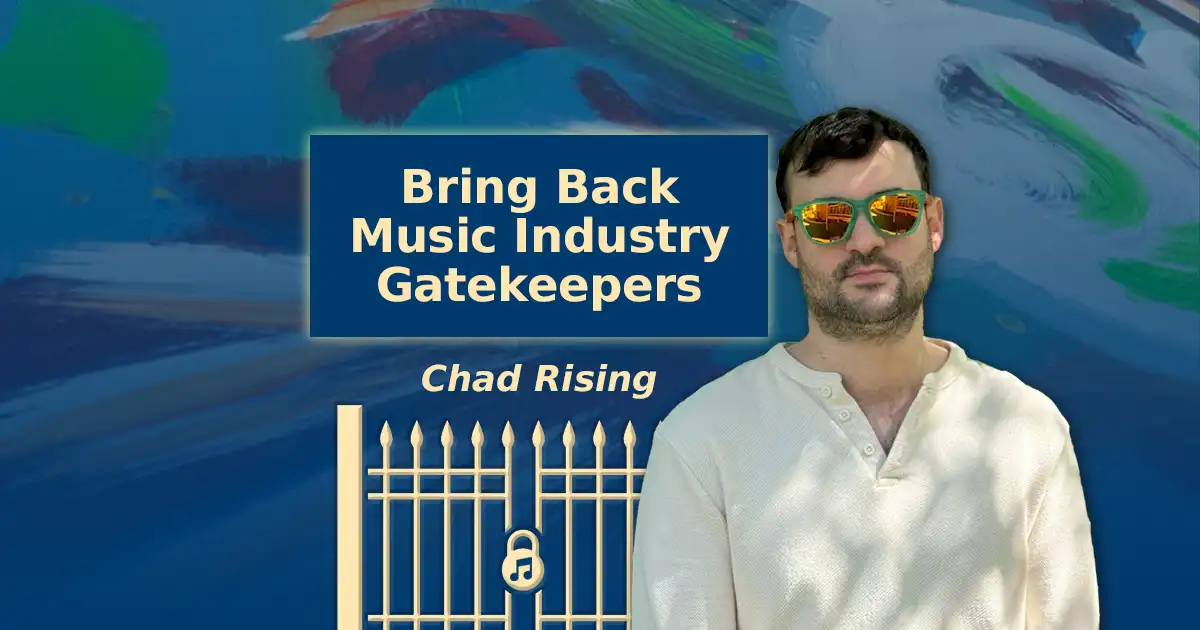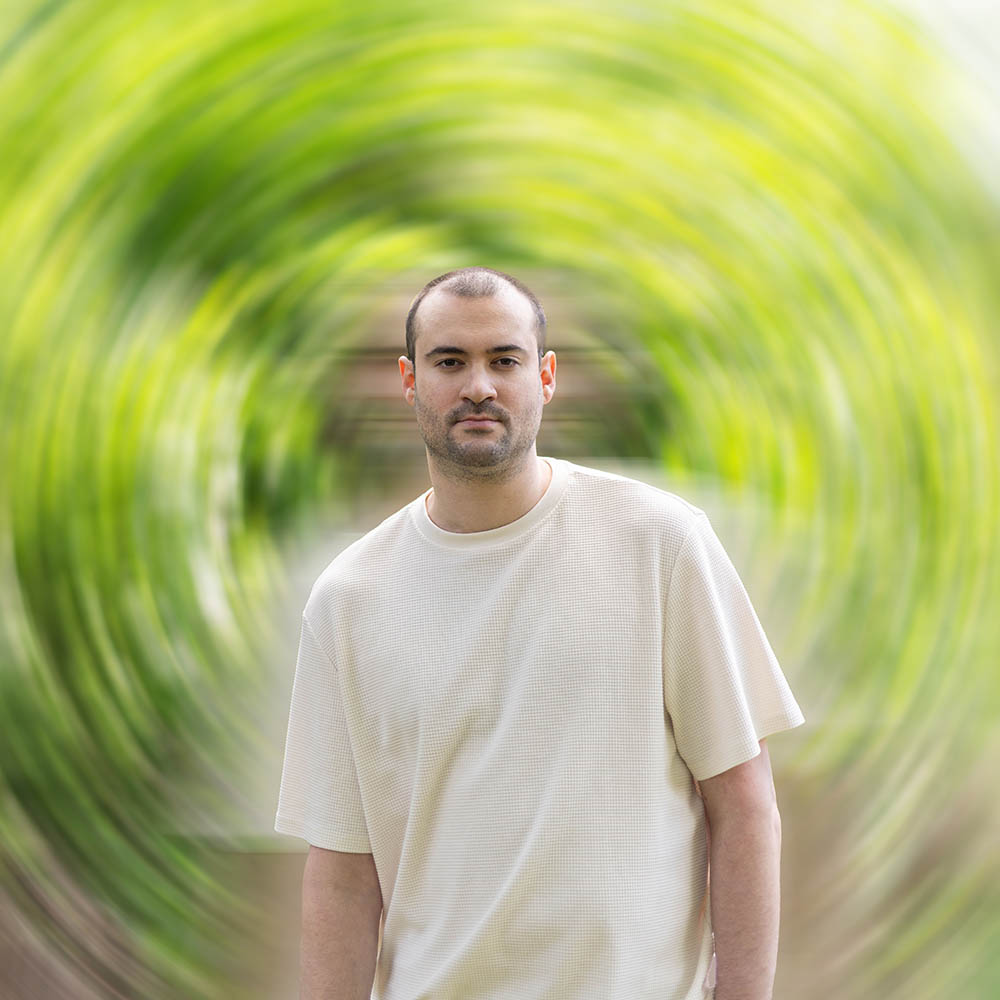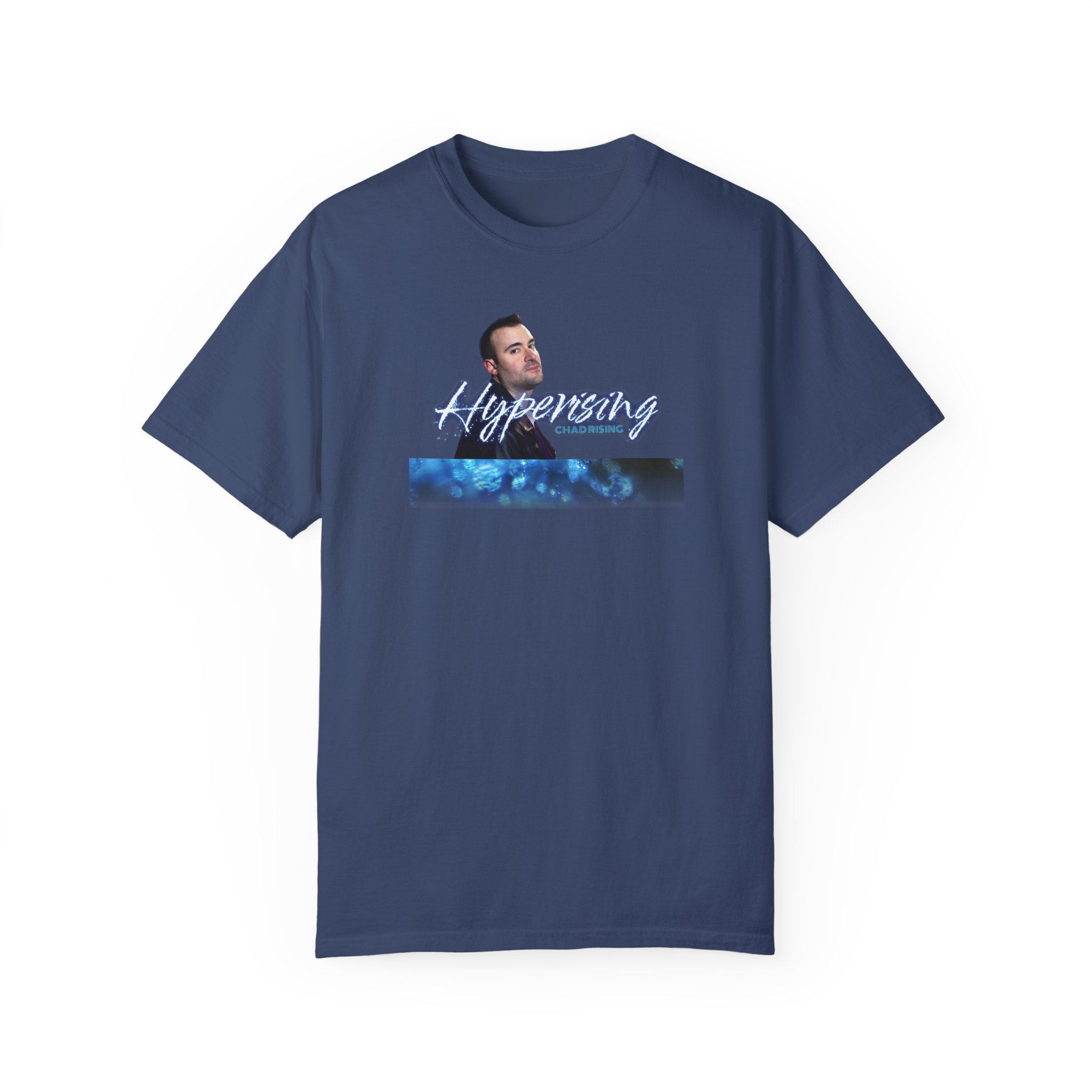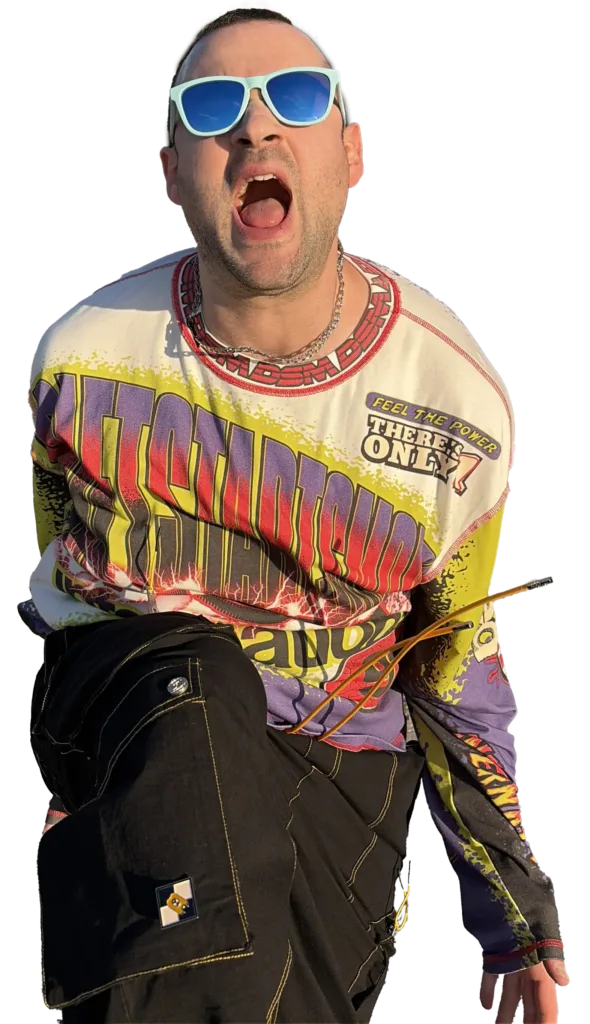Bring Back Music Industry Gatekeepers

There’s no longer a platform akin to the record store, which inherently told the buyer “all music in here is professional.”
The original headline for this article was “Too Many People Are Trying To Be Artists.” I intentionally write triggering titles and I bet that one would make many people fume, but as I wrote, the broader topic revealed itself. What I really want to say is that I think the music industry should have certain gatekeepers again. Because there are too many people making mediocre music and uploading it to streaming services. The former is inconsequential to culture and industry – it’s the latter that’s the problem. This flood of mediocrity has created so much noise that it is now harder to find music that speaks to your soul than it was when you had to dig through shelves and crates at the record shop. (This also affects the livelihood of songwriters, but this article won’t be touching on that.)
Two facts have brought us to the current state of music industry and culture:
- Technology has made it easy for anyone to create “music.”
- Technology and the internet has made it so anyone can upload that music (technically any audio file) to streaming services like Spotify, which can be compared to giving anyone shelf space in a record store.
Hobbyists Are Not Artists
First off, I believe that living as a human being is the highest form of expression and art. Everyone is a creator simply by being a human on Earth, and it’s not hard to make the jump that everyone is or can be an artist in some way. That said, I’m using the term artist as a vocation in this article.
Over the last 20 years it has become very easy to create music, relative to what it took before the digital age. On top of that, in the last year, AI has lowered that barrier of entry to virtually zero, which has created exponentially more “artists.” The number of artists in the world has gone up, but not the number of listeners, and therein lies my point – there are too many people acting like and trying to be commercially viable artists. There is far more supply than demand. This is a new phenomenon.
In this article, commercially viable does not mean mainstream or mass appeal, it means people would be willing to pay for it if streaming subscriptions were not all-inclusive.
How many of these “artists” contributing to the 100,000 songs a day are true artists?
Is a person vocationally an actor because they acted in their high school play?
Or vocationally a singer because they sang in church choir?
Or vocationally an artist because they doodle on their iPad and post it on social media?
Does that high-school actor or off-off Broadway actor get to rub shoulders with working actors and film stars?
Does that iPad doodler get hung in the same museums and galleries as working or legendary artists?
I believe the answer to all of these questions is no. Then why does literally anyone get to be in the same virtual record store and algorithmic pool as working, high-caliber and/or legendary musicians?
I believe everyone should express themselves. Expression is a natural and necessary human function. It is beneficial to the individual and therefore society. I would never encourage anyone to not sing, act or draw, but, I don’t want to hear what Jane’s nephew Jimmy created on his iPhone and I don’t want to see their doodle in an art gallery.
Lack of Respect for The Craft
Back in the day, before social media made it possible for anyone to kickstart a “career” in music, you had to have music coursing through your blood to break in to the music industry. (Besides nepotism, which is also a growing threat in entertainment, but will not be considered in this article.) Music had to be your life’s purpose. Nowadays, we’ve lost so much respect for music as the otherworldly and frankly expensive magic that it is. Now, with technology, you can wake up one day and decide to be an “artist.” This is great in that it allows people to try new things, but it diminishes the value of the true artist and true art that comes from the soul and heart, not from the ego.
It’s a Free-For-All On Spotify
When Spotify first started, an artist had to be legitimate and already successful or on the way there to get their music listed. There was a barrier to entry. You had to work hard, create great music and know people to get on Spotify. (Read: be a signed artist.) This is how it was for all of the recorded music industry’s history. There were gate keepers, which kept the quality and respect of the art extremely high. (Admittedly, gatekeepers certainly blocked worthy individuals from seeing success, but that’s a separate issue I won’t go into here.) Eventually, in the late 2000s, services like TuneCore emerged as an intermediary that allowed anyone to submit their music for a fee and have it available on iTunes, Spotify and eventually all streaming platforms. (Personally, even as an artist back then, I was shocked to find out this was possible. While I took advantage and uploaded my music as early as 2010, I knew in my heart that this wasn’t good for culture.)
Distributor-shmibutor
Historically, distribution companies are the entities that moved physical music media (CDs/tapes/vinyl) to the record stores. Their customers (the artist/label) by default had to be committed to the craft just to produce the physical product. I honestly don’t know the names or reputations of any distribution companies of the legacy industry, as I was not old enough to pay attention at that time. But today, distributors are online companies that strike deals with streaming services (aka DSPs) and charge artists an upfront fee or take royalties on the back end to handle the process of receiving, tagging and submitting music. (Well, now they put up literally anything that’s able to be put into an audio file, e.g. white noise, functional music, podcasts, audiobooks.) Today there are dozens of distributors with more popping up every year because just like music, the barrier to becoming a distributor is fairly low.
After using Tunecore to distribute my music for many years, I decided to try the #1 distributor, Distrokid, and I remember how empowered I felt to be able to click a few buttons, pay a small fee for unlimited uploads ($20/year!), and have my music appear on Spotify in a few days. (Now music can go up within hours or overnight.) Sounds great, right? I can’t deny that the streamlined process and technology is incredible and has democratized a segment of the music industry. But in the last ten years, this democratization has led to just as much rot as progress.
Jimmy’s New Beats
Remember Jane’s nephew Jimmy? (A made up person, FYI.) Jimmy is 20 years old. He’s just discovered how to make beats with FL Studio and has produced a few simple beats that sound decent enough to the untrained ear. This rightfully excites Jimmy. He has created/produced music! How cool is that? It is cool. I am happy that Jimmy has a way to creatively express himself. Now comes the unpopular opinion. Should Jimmy be allowed to submit his very first amateur productions into the same marketplace as Ed Sheeran and Drake? One would assume no, right? Should Jimmy’s mediocre beats and songs be shelved right next to Katy Perry or Celine Dion in the local record store? NO! Well, that’s what distributors like Distrokid and DSPs like Spotify facilitate.
~~~~~~~~~~~~~
Sidebar story time: At the beginning I was – as every artist is – just like Jimmy. When I first started making original music in 2010, I wrote, recorded and produced the songs myself, bought CD-Rs and jewel cases, designed and printed the CD inserts and burned the .wav files onto said CD-Rs all by myself. Even though my early music was not commercially viable, I wasn’t expecting it to be sold in the local record store. If I had even tried, they would have said no and that would have been appropriate. I would have to get bigger and better to earn the right to be sold at a real record store. Instead, I sold these demos at a club I was given the opportunity to perform at. I sold the CDs for $20 each. Between these record sales and my “day job” I eventually earned enough money ($1,000) to pay a producer to professionally produce and record my first song! This is (a fraction of) the hustle that is no longer required to make or distribute music.
~~~~~~~~~~~~~
An important fact here is that virtually all DSPs (Spotify, Apple Msic, etc) are a business; they charge their customers (listeners/users) and pay their suppliers (artists, labels, rightsholders.) Jimmy is now a supplier, so Spotify must pay him. Though, is he really commercially viable yet? No. Would a venue pay him to perform at this stage? No. So why is he on a commercial platform that pays? That said, should he have a place to showcase his music? Yes. Should it involve syphoning money or distracting the algorithm from commercially viable artists? No.
(Spotify is attempting to address the money part of this by demonetizing (not paying) for songs that get less than 1,000 streams/year. I agree with this direction, but it’s a slippery slope and doesn’t solve the whole problem. Streaming royalty rates and fee structure is a whole ‘nother topic that influences this issue but isn’t covered in this article.)
When Spotify started it was exclusively major and big independent label music only. Now, Spotify et al accept Jimmy’s mediocre beats and will even attempt to serve them up to listeners that it thinks may like his music. If everyone skips his songs, the algo will stop pushing it pretty quickly and Jimmy’s music now sits collecting digital dust, hogging up server space and getting in the way of commercially viable music. But hey, Jimmy is still on Spotify: the world’s premier record store, so his friends and family know he’s legit! (Right?) If Spotify were a record store, CDs that have stopped selling would be sent back to the artist or label to make room for music that does sell. (Yes, retailers are/were allowed to sell unsold CDs back to the label, which the artist had to pay for! But that’s another story.)
Unsocially Conscious
This article is solely discussing DSPs, but Jimmy’s “content” on social media is doing the same thing: hogging up space on the platform which only sullies the pool for more qualified artists and music to be picked up by the algorithm. Additionally, his low quality content is slowly contributing to the public going sour on fledgling artists in general. This makes it even harder for other serious artists to see the light of day if the real human audience is giving less of a chance to anything new, unfamiliar or avant-garde.
Separate the Best From The Rest
Right now there’s not a digital platform/marketplace akin to the record store that inherently tells the buyer “music in here is of a certain level of quality.” You wouldn’t go to a record store and expect to find Jimmy’s half-assed beats or my 2010 CD-Rs. You’d be pissed if the record store allowed you to buy a low quality product. (Production/songwriting quality and genre/taste in music are different. Based on my knowledge, record stores only carry/ied commercially viable music, regardless of genre, and that’s why I’m using this metaphor to make my point.) So why are we allowing poor-quality music, wishy-washy artists, literal noise and sleep meditations to intermingle with the Ed Sheerans and Taylor Swifts of the music world? It doesn’t make cultural or economic sense. (Except, it does make economic sense for Spotify #capitalism.)
Society and culture need hierarchy to function. This hierarchy should come with respect at all levels, but there still should be levels and gates to some of those levels nonetheless. Spotify could easily create a function for users to choose: “show me pros/show me amateurs” and that may begin to create some hierarchy. However, Spotify is now, and always probably was, a capitalistic machine designed to print money for it’s stakeholders. Spotify is never going to change, so I won’t use Spotify as the example in my idea, but what if there was a platform that was gate-kept?
A Music Streaming Platform With Quality Assurance
What if there was a new platform that only allowed high quality music made by working artists on its platform? Would you use it? Would you get excited when you opened the app knowing you’re only going to encounter music of a certain level on there? Would you feel better about artists being treated more fairly? Would you look forward to your Release Radar and New Music Friday? In fairness, Spotify’s editorial playlists like New Music Friday contain only the highest quality recordings, so the editorial aspect is not an issue here, isn’t what this article is about and wouldn’t be a selling point of the new platform I’m ideating. The selling point would be that it’s commercially viable music from working or dedicated artists only – something that doesn’t currently exist. No podcasts, no noise, no audiobooks, no amateurs.
Can we introduce a new platform that only serves up top quality music from vetted artists? If Spotify and the like was left alone to proceed however they want, what would the harm in this be? Going about determining what music gets on would be an intricate process of checks and balances to ensure gatekeeping is based on quality and not connections or money. That would take lots of labor time to facilitate and I’m not considering the nuts and bolts of financing it, but billionaires take day trips to space, so I’d say it’s possible.
“Distributors” could turn into “qualifiers” and instead of being in the business of approving everyone, they’d be in the business of rejecting most, in the effort of finding the true diamonds, which would likely be rewarding in it’s own right, both monetarily and morally. Eventually, the public and the market would learn what level is acceptable and the flood of submissions may die down. It may take a decade or two, but it would happen. The masses aren’t dumb, we just need morally, ethically and spiritually competent leaders.
The Future of Music Gatekeepers
This is the future I want to see. I long for gatekeepers of quality and artistic integrity to return and keep amateur and hobbyist noise out of the mainstream market. Do I have a personal interest in this for my own work to be recognized and included? Yes. Does that in any way stop others from doing what they want to? No. My vision can be altruistic and self-serving at the same time.
People often say I’m just thinking about myself when they hear my ideas or complaints about the music industry. Well, yes! I am often thinking about myself, but it’s both as a consumer and an artist. What I want for myself, I want for the whole of humanity and for other artists like myself who are struggling to cut through the noise of the low-brow free-for-all that is the internet. This can be applied to visual art, fashion, and just about every creative industry. In every creative industry, the ability for anyone to do anything is backfiring. The pie is becoming smaller and smaller. Success and making a living from that pie becomes less attainable with each hand reaching for it.
Art Doesn’t Happen On a Whim
The internet was supposed to, and brief period did, make success attainable to those that it was not before. But we’ve tipped too far, and now it’s made a certain level of success and influence even less attainable than pre-internet, and sometimes given that success and influence to less than deserving individuals. You used to have to want it, be it and live it more than anyone else. Now, you can have some level of success based on a whim that turned into a viral moment. Success should not come on a whim. It should be earned and deserved, and frankly, many who have the fame, money and influence don’t deserve it. Do I believe I deserve it? Yes. But I stopped complaining, wishing and living in envy a long time ago. Now all I do is work hard at my dream and call out the b.s. as I see it along the way.
Bring back gatekeepers to bring true art back to the forefront and push noise and wannabes back to the fringes.
– Chad


